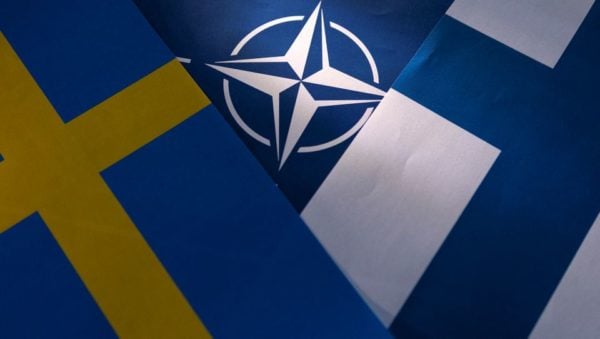
NATO, Swedish and Finnish flags are seen in this illustration taken May 12, 2022. REUTERS/Dado Ruvic/Illustration
The unexpected assault by Russia on Ukraine adjusted the view most Western Europeans had overnight of a peaceful Europe. At the same time, Central and Eastern Europe’s weariness of Russian Realpolitik since the fall of the Cold War was legitimised. Much of their relatively new NATO based equipment and Warsaw Pact updated equipment was put on high alert since Feb of 2022 as Poland and their neighbours feared a repeat of history defending a mass invasion from the East. Germany’s energy policy and military policy changed almost completely, and former neutral countries who would have never considered joining NATO even as late as last year, are now poised to become significant new members.
While NATO members in North America dither on whether or not to provide an appropriate energy solution to Europe during an active conflict that depends on that policy, European powers that are currently not part of NATO have broken with their official traditional neutrality.
Finland stood as one of the only nations to successfully repel an attack by the Soviet Union in the 1930s and held a position of neutrality since the end of the Second World War. Neutrality in Finland’s case was committed to in order not to illicit a response from their Eastern border with Russia. The avoidance of conflict kept Finland in relations with their Scandinavian allies, with a strong Navy and technical and political support from their Western neighbours without being a NATO member. At the same time, Finland kept lines of communications open with their Eastern neighbours, even purchasing Soviet and Russian military equipment from them for Finland’s own defense. Finland’s border with neutral Sweden likely accommodated this political approach as well.
Sweden’s approach since the end of the Second World War was to build a strong local defensive structure in order to repel any attack coming from the Soviet Union. While NATO produced a combined arms approach, countries like France and Sweden took to building on their own defense industry focused on their own territory and geographical challenges. Sweden often designed defense equipment suited for a war in Sweden, with tanks designed to hide and hit invading Russian tanks in the Swedish forests, and planes designed to land and take of from highways and local roads. The contribution of Swedish anti-tank weapons to Ukraine are a reflection of generations of weapons designed to blunt a Russian invasion force.
The strengthening of NATO is surprising as since the end of the Cold War, decades of peace turned NATO into an organisation that was a reminder of a past long gone. The invasion of Ukraine was a result of policy errors and egos that could likely have been avoided or managed, with a wake up call that has not sounded for a generation. The study of European defense during my education was seen as an empty field, as trade agreements and post-Soviet reconstruction dominated International Studies discussions at that time. The result of bad policy may have come from the limited number of experts making decisions that created the possibility of conflict in Europe. Right now, those who have spent time vacationing in Kyiv and Moscow, married people from both regions and have family who speak those languages are still shocked by their peaceful lives turning into the hard times endured by their grandparents.
It will likely be the case that poor decisions during the current conflict in Europe will result in increased conflict in other parts of the world. Bad policy decisions have hard consequences, something our grandparents learned in the most difficult of ways.